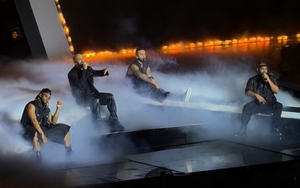*****
A LOT has happened to Alan Turing since Breaking the Code was first staged in 1986. Back then he was known to a select few as an important computer scientist and cryptanalyst; today he’s practically a household name. His codebreaking work at Bletchley Park, first publicised in 1976, has become a crucial part of the British World War II story, and his test for artificial intelligence is frequently invoked in popular culture. There’s even a legend that the Apple logo was inspired by his death; disappointingly, this isn’t true, though when Steve Jobs was asked about it he said ‘we wish it were’.
Given the wider awareness of Turing’s life and work, what more can a thirty-year-old play possibly have to tell us? As it turns out, quite a lot. Currently, the Turing best known to the public is the one played by Benedict Cumberbatch in 2014’s The Imitation Game, a distant relative of the actor’s Sherlock Holmes: arrogant, abrasive and flamboyantly brilliant. The Turing in Breaking the Code, by contrast, is substantially more down-to-earth. Though socially awkward and sometimes pompous, he is at least capable of going for a drink in the local pub without having a blazing mathematical epiphany and knocking over your pint. He reads novels, cooks a decent roast, goes running once in a while – perhaps most remarkable of all, he’s actually quite funny. And he gets laid with reasonable frequency, which is where his problems start.
The dramatic pivot of the play is Turing’s 1952 conviction for ‘gross indecency’. Following a burglary at his house, he naively admitted to a police detective that he was in a sexual relationship with another man. The detective charged him, and he was obliged to undergo a year-long course of oestrogen injections in order to ‘reduce his libido’. The first act focuses on this series of events, using flashbacks to explore Turing’s character and the passions that inspired his life’s work. Far from being a human calculating machine, he comes across as a man of deep emotional attachments; his idea for an ‘electronic brain’, we’re told, has its roots in the loss of a childhood friend for whom he had unconsummated romantic feelings.
The second act, though less prone to time-hopping than the first, is more diffuse. The ‘crime’ having been committed and punishment meted out, we see Turing in a variety of loosely connected situations: delivering a lecture at his old school, being interviewed by an intelligence officer, holidaying with a beautiful Greek boy. The resulting picture is poignant, but less harrowing than you might expect: far from being a broken man, he seems enthused by his work and hopeful for the future. He tells his one-time fiancée – an authorial invention – that the ordeal has brought him closer to his mother, and jokes about how the hormones he’s taking have made him grow breasts. This last detail, often cited as evidence of the wretchedness of Turing’s fate, here seems almost amusing – a risqué confession to a close friend.
For the most part, this unexpected lightness of tone works in the play’s favour. Instead of Turing the victim we’re shown Turing the dreamer, an independent soul who continues to pursue relationships with other men, despite warnings from his government handlers. Intellectual idealism and an indifference to repressive social codes – the real subject of the play’s title – allow him to rise above the prurience of post-war Britain. And yet there’s no escaping the unhappy ending. After all that’s come before, his suicide seems oddly incongruous: might it really be the case, as his mother suggests, that he simply forgot to wash his hands after handling potassium cyanide? If we’re invited to consider this possibility, it’s not for very long. A final monologue, delivered as though it were part of the earlier school lecture, teases at the idea of an escape from the ‘cold porridge’ of the human brain to something grander and more enduring. But even as a metaphor, this seems unduly optimistic, and we are left feeling that there are depths of suffering here that the play simply does not wish to explore.
Despite this reticence, Breaking the Code is an enjoyable and thoughtful work, one that reminds us of the muddled human life behind the legend. Daniel Rigby is excellent in the lead role, awkward and mannered in just the way we might imagine the real Turing to be – bad at small talk but passionately eloquent on the topic of Gödel’s incompleteness theorem. The rest of the cast offer capable support, particularly Raad Rawi in a largely comic turn as Turing’s Bletchley Park supervisor Dillwyn Knox, but in the end it’s more-or-less a one-man show. ‘I should have played the game and stuck to the rules,’ says Turing to a friend. Of course, you know he doesn’t mean it.
Breaking the Code is playing at the Royal Exchange until Saturday 19 November
 Powered by Wakelet
Powered by Wakelet










